Bourke Ulick J. Easy lessons, or Self-instruction in Irish / Легкие уроки: самоучитель ирландского языка
Подождите немного. Документ загружается.


SELF-INSTRUCTION IN
IRISH.
219
}]'
ri
"71
^i^1|te
T
—
T^i
A
Civ lí\^) be
beAi)r)ACCA]b
bo
5AC
iille
IcAub
A15 A
b-|ni]l 5]tC\6 a]]i
TrjACA^ii
60 ceAi)<vrbAil.
28.
b-]'it|l
I'lOf
A13
bo
6eA|ib-fiii|x
a^i
ai}
it)é|b
|-o
?
29.
"Civ
fl^r;
Acc
tr>A]t
50
leo|i A
i)e]cib
be'i)
c-fArr)All
]*o,
lev\i)Ai}T)
n
c<\-ir)c
TAob-bAO
a5U|*
cuiiteAr)') ai|i
\e\t C]aII
A5U|*
cui5fii)c.
31.
2ibAi|t,
it>A
'y
ye
bo co]l
6,
at)
Tt)é]b
A
bub<si|ic
rt)]fe.
32.
«iDéAttpAb ;
acc
i)]'l aoi; 5A]t
aijo.
33. SIai)
leAC.
TWENTY-SEVENTH
LESSON-
SIM
se2icT:2t)2it) tejSesiH 2ijR pjcj^t>.
EXERCISE
XLI.—
2iri
C.^ílON2Í)2lt5
BM^tuSSlÓ
211R
t52l
PICGSIO,
2t)<\|i5Ai]t&Ab,
6lifAbec, A5Uf
a
(her)
beAjibfiuft.
1.
2lo *'rD<\ic
leAc"
]*iub<vl, a
cajia
ttjo c|to]6e?
2.
jf
"n)<vic
liotT)"
]*iiibAl;
acc
]m]y
^Art)
a
"b-c|5
l]vv" flubAl
cji^b i)A
rt)ACAi]ti6
;
ó]]x
\e]y At)
filt|r)e
A
]tiv6
leAC,
tji
flubAlpAb Aljl
AT)
Tr>-b0CA]t
Tt)5|l
?
3.
SeAÓ,
"
CI3 liw,"
óijt
Tj^'l
b|iucc, t)0
f-eAjtcAir) ai|i
ai? b-peu|i. 4.
"j|*
beAf
l]0tt)"
f
jubAl
cjtib
i)A
rnACAjitjo.
5.
2lo
"
pe^jiji
leAC-^V
T)A
p<\]|ice T)A Ai)
bocAjt?
6.
ji*
"
pei\|t|i
l[Oir)." 7.
2li)
beAi*
Igac
I'jubAl
Ati)<\c A]]t c|ti\c
t)<v n)A|br;e
(pr. maynh-
ne
—bi)
=
double
^}
in sound). 8.
M]
"beAj* \]on)"
-\y
"
be^fe
llOIt)"
j-lubAl
Att)AC
At)
C|lAC-1)0t)A.
9-
B'
feib]]t
5U]t
"ri)A1C
le"
ho
6eA]ib-fjit|i
céACc
\]\)X)
A5111*
Uaca i;o
|'coca a
buA^ijc.
10.
M)
"c]5 lejce"
céAcc. 11.
peuc,
b'peib^ji
50
"
b-c]3."
12.
30
c|t)ce rj]
"tdajc
liom"
]
^í^SajI
"le^co
y^r)"
cA^lii)
CO aIu]1)
a'i*
cCv
y],
13. í)e]|i
y]
5u|i
"n)A]C
le]ce" ceAcc, acc t)ac
"
peib]]i
le^ce," TTjurjA
b-pivJA^O
cii-
rv\
ceAb.
14.
"
"^15
liOTt)"
-pé]!)
ceAb a
CAbAjitc
6].
15.
"CCv
50
xx)^yty
CA
rrje
c|t)ce 5U|i
"
pei\|iii
le|ce" ceACc 'tjA
fíAt)Acc.
16.
"
B'
feA|i]i
l]OTT)-fA"
pé]i)
50
b-C]0CpA6
]•].
17. 2ll)
bUAÍ
6]
pA1)ACC
']•
Al)
TT)-bAlle?
18.
M|
bUAl,
le)f
AT)
'pi|iiT)e
'iiC\6;
]|*
"5t)ACAc
le]ce" be^c
a
5-cu]beAcc
A beA]lbf|U|t.
19.
Oc
T)AC
i\\\.l\X)
ATT)A]1CAI)1) 1)A
TDACAlltlb,
T)AC ivlu]i); peuc
\)^
T)0|T)it)i6,
at)
cii-r)e
^jaSaii),
t)a pe]c-
leo5A,
A5Uf
i)A
blACA
f|AÓAr)A
U|le; t)ac beA|*
at;
|:leAf5-
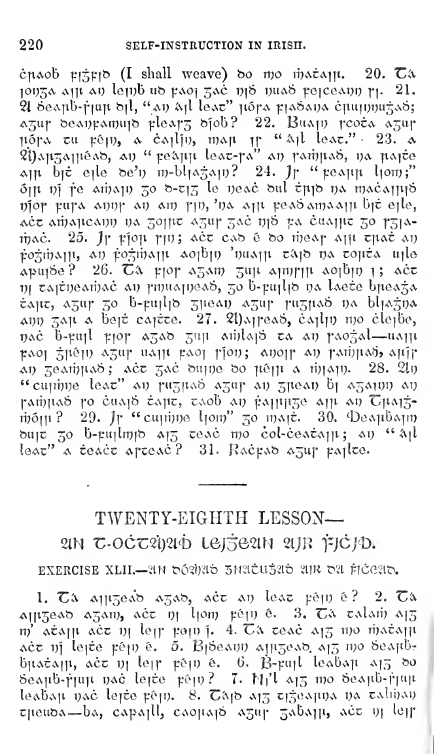
220
SELF-INSTRUCTION IN
IRISH.
cjiAob
>*15P1^
(I
shall
weave)
bo rt)o
rbACAiji.
20.
T^iv
]0t)5A A^ji
Ai) \e]\)h ub pAO] 5AC i)]6
i;ua6 ^rejceAiji)
]*i.
21.
21
beAitb-f-iu|i
b]l,
"
ai)
^il
leAc"
-[lofA
]íta6ai)a
c|iiiii)i)ii5a6;
A^uf
beAi)VAtt)ii]b
^leA|*5
bjob?
22. BuAp)
fcocA
A'^^iy
]tÓfA
Cll
^ép),
A
CAlljl), 1T)AII
ll*
"
iV]l
leAC."
•
23.
A
íJÍ)v\]t5Aiii&Ab,
A1)
"
]:eí\|i]i
leAC-f
a" ai)
fArb[tA6,
t)a
|iAiée
A^ji
bic
e^le be't) iT)-bliA5A]r)?
24.
jf
"
|:eA]t]t
lion);"
oiit
v] fe
ArbAii)
50
b-c|5
le i)eAC
bul
qt^b
ija
rnACAHtib
r)ioy
yuyA
Mmy
atj
ao)
fir),
'oa
ai|i
feA6Amv\Ai|i
b^c ejle,
ACC
ArbA^tCAl)!) 1)A
50]flC
A^^liy
5AC
t)]6
fA
CUA]]IC
50
f5|A-
ti^AC.
25.
)y
yio]x
]-]\);
ACC CAb
é
bo Tt)eA|* a]]i c|iac
ai)
•f:05rbv\ni,
Ai)
fl-o^ifjAUt
AO]b|i}
't)ua]]i
civjb
rjA co]vca ii]l6
Apuibe?
26. "Civ
lifOj*
asah)
5u]t
A]njfi|i
AO]bir)
-\
;
acc
1)]
cAici)eATt)AC
Ai)
fnjuAiueAÓ,
50
b-]:ii]lib
ua
Uece
b|teA5A
CAitc,
A3Uf 50
b-|:u|l|b
5iteAi)
A5Uf
fu^jtAÓ
ija
Ujaspa
At;i)
5A]i A
bejc cA]ixe. 27.
2l)vVi|*eA6, catIji)
n;o cle]be,
T)AC
b-fu]l
\:]oy A5Ab
5U]t Aii)l<v]6
ca ai)
]*ao5aI
—
u<\]^x
^AOi
51t<)
A5Uf
UA^ji
fAO]
i*ioi);
Ai;oi|*
ai?
fArbiiA^j
AJllf
Ai)
seAH^iiAO;
ACC
5AC
buitje
bo
116111
a
rbiA^t).
28.
2li)
"CU1TT)1)e leAc"
AT)
|*U5]tAÓ
A5Uf
AI) 5|ieAl)
bl
A^AII)!)
AI)
fAli)t^A6 I'O
CllA]6 CA|tC, CAob
AI)
f<.\]]t]X-^e
A]|X
AI)
'C]l^\^^^•
xr)ó]]\?
29.
)]'
"cu]ri)i)e
Ifort)"
50
ii)A(c.
30. í)eAiibA]ri)
bu|c
50
b-iiu]ln)]b A15
ceAC n)0
col-ceACA]fi
;
ai)
"
iV]l
leAc"
A
ceAcc A|*ceAC
?
31.
KACpAb
A5uf
fAjlce.
TWENTY-EIGHTH LESSON-
SIN
T:-ocT:2i)2i'b
lejSesiH 2ijh
T^jcjt)*
EXERCISE
XLII.—
21N
'OOWnb
SMSICUS^IÓ
ííljR 021
nCCSltí.
1. "CCv
A]|i3eA'b
AjAb, acc
ai) Icac
f:é|i)
é? 2.
"Civ
Ai|t5eAb
AjAH),
ACC I)]
liofi)
pell)
é.
3.
TII^x
caIatt)
AI5
rt)'
ACAiit
ACC
1)1
leii*
poiD
Í.
4.
"CCv
ceAC
A15
n)o
njACAUt
ACC
1)1
leice
pep)
&. 5.
B|6eAi)i)
Ain^eAb
A15
n)0 beAiib-
bitACAiit,
ACC
1)] leii*
pep) &.
6.
B-K»ll
IcAb^ii
a|5
iio
6eAiib-ppiii
i)Ac
leice
pep)?
7.
M|'l
a|5 mo
boAiib-)-pi|i
leabAH
i)AC
leice
pt»p).
8.
'C<.\\'o
aij
ci5ca]ii)a
i)a
caIiíjai)
CJieUbA
—
bA, CApAlll, CA0|lAl6
A5Uf
5AbAl|l,
ACC
1)|
le|i'

SELF-INSTRUCTION IN
IRISH. 221
^&IO
]v\&. 9.
"C^ At)
CaIaH) yo
TDAIC,
ACC T)] IjT)!)
^6)1)
],
10.
ieir
at;
f]]i]me
a
jxao,
t)]
liuo
V^]V
^\^
^ll^
'^l^*
EXERCISE XLIIL—
21N
CRÍ3Í32ÍÓ 5K2ltU52iC)
^IIK
G21 Flce^iitJ.
1
. Whose is this town
? 2. It belongs
to
the lord.
3.
Whose
is this country?
4. It
belongs
to the people of
Ireland.
5.
Whose is
this land?
6. It is mine.
7. Is it
not
your father's?
8.
It is not.
9.
Whose are
the cows and
the
sheep, the land
and
the beach? 10.
They
belong
tc
the
lord
of the soil.
1 1. Whose is this
calf? 12. It
belongs
to
the owner of
the cow, as the
adage
says. 13. Thanks
to
you,
I know that
to
the owner
of
tlae
cow the
calf belongs.
14.
But whose
is the
cow
; does
she
belong
to
your brother?
15.
She does. 16.
Whose
is
this
stripling? 17.
Is he the
son
of
the gardener, or of the
ma7i
of
the
big house
?
18. He
is the
son of the gardener.
19.
He is
a good young
man.
EXERCISE XLIV.—ÍIN
Ce2lt2lR^'ilD
5MátU52lt) U]n
tiSl
^Ce^lO.
1.
CjA
leif
At)
bv\]tttéAb
xo?
2.
l,ion)-|*A.
3.
Cja
\e]X
An
ceAC
^o? 4.
Le
SeC\3Arj. 5.
Cja
le]f
At)
fojAi) fo?
6.
l,e
SiuéAb.
7. CjA
leii*
At)
peAt)t)
fo?
8.
Cja
le^f
AT)
pApé||l
1*0?
9. CjA
\e]X
At) ftubAC
fO?
10.
C]<\
le]|* A!)
bubAbAi)
fo?
11.
CjA
\e]X
At) ]*Iív,ca
fo?
12.
CiA
le|f
At) cle]ce
fjt)?
13.
Ci<\
le]f
At)
cApAÍ |*o
civ
A13
SeATtjuj*? 14.
Ci<v
le]f
At)
co|*Ati)ÍACc
^o? 15.
Cja
be AT)
iort)Ai5
fo?
16.
Ct<v
"ajji" b-|:u]l
At)
fciv]|i po?
17.
CjA
"le]i*"
At)
leAbvXjx
|xiv]]te
]*o? 18.
Ci^
le]|*
At)
Ajiat)
1*0?
19.
CiA
\e]X
At)
freo]l
fo?
20.
Ci<x
le]f ad
cu
]*|T)?
21.
Jf
le
Tt)'ACA]|i
Í.
22.
Cia
lei]*
^i)
tnAbí^ó
Ub
A5llf*
At) TT)I0l-CU
|*]T),
A5U|* AT)
Tt)Ab<\6
uii'5e
ub
cA.
A5Ab-fA?
23.
'H]
leAC-fA
^Ab.
24.
21t)
i-iubAlpAjo
cu
[[OtT),
n)i\
Y
fe
bo co]l
é,
Aj]i
bjtuAC
#a
l)-AbA]i)e
fo
?
25.
Siub^lfAb.
26.
2Ji) b-]:e]ceAt)i)
cu
At) co]t|i
caU
Aifi
b]tuAC t)A
lii)t)e
? 27.
7*^1^1
17«
28.
pe]ciTTj 5jo]i]tf|A]ó,
A5ur
co|i)]i)]6,
A5ur
co]]i|i
sUfA,
A5uf
co^x-V-
bíM)A
50
b-u^le
At)t)
fo
;
-\x
]*iATT)|*AC
AT) ív]c
Í
;
cjA
leii*
í
? 29.
jp
le
ceAT)pA]ac i)A lA|5eAT)
^.
30. "Cii
TDe
bu|óeAC óujc
X^o]
t)0
óeA5-p|ieA|*cAl, acc
\x
^151'^
^^"^
^"^
5^
bAile
2lCA
-Cl[AC
A
T)5CC. 31. "Civ
]-e
At)l) ATI)
]n)CeACCA.
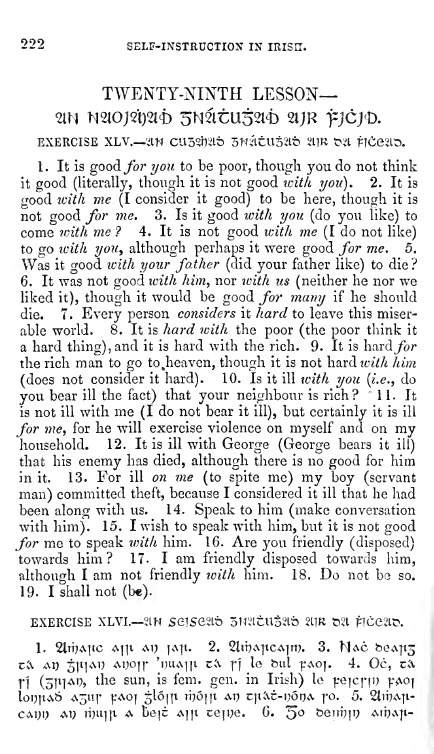
222
SELF-INSTRUCTION
IN
IRISC.
TWENTY-NINTH
LESSON—
EXERCISE
XLV.—
'^N
CU5Si)^t)
3NátU52lb
^UR t^il
^lCeSlD.
1.
It is
good /Or
7/ou
to
be poor, though
you do not think
it
good
(literally,
though it
is not
good tvit/i yoii). 2.
It is
good
toith me (I
consider
it good) to
be here, though
it is
not
good
for
me.
3.
Is
it good
loith
you
(do you like)
to
come
loith
me
?
4. It is not good icith me
(I do not like)
to
go
icith
you^ although
perhaps it
were
good
for
me.
5,
Was
it
good
xoiili your
father
(did
your father like)
to die?
6. It
was
not
good
icith him, nor loith
us (neither he
nor we
liked
it),
though
it
would be
good
for
many
if he should
die. 7.
Every
person
considers it hard
to leave this
miser-
able
world.
8. It
is
hard icith
the poor
(the
poor think
it
a
hard
thing),
and it is
hard with
the rich.
9.
It is hard/br
the
rich
man to
go
to.heaven, though it
is not hard icith
him
(does
not
consider it hard). 10. Is it ill
icith you {i.e.,
do
you
bear
ill
the fact) that
your
neighbour
is rich ? 1
1
.
It
is not
ill
with
me (I do not
bear it ill),
but
certainly
it
is
ill
for
me,
for he
will
exercise
violence
on myself and
on
my
household.
12. It is
ill with George
(George bears
it ill)
that
his
enemy
has
died, although
there is no good for
him
in it.
13.
For
ill on
me
(to spite
me) my boy
(servant
man)
committed
theft, because I considered it ill that
he
had
been
along
with us.
14.
Speak to him (make
conversation
with him).
15.1
wish
to
speak with him,
but it
is
not
good
for
me to
speak
vnth him.
16.
Are you friendly (disposed)
towards
him?
17- I am
friendly
disposed towards
him,
nlthough I
am
not
friendly with him.
18.
Do
not
be so.
19.
I
shall
not (b«).
EXERCISE
XLVI.—
21N
SQ^SeUt
3NiltU52lb
2nR
t)2l
PIce^lD.
1. 2lrbA|tc
A]]!
AT)
|A|t.
2.
2lit7A|tcA]n).
3. Mac
feeAjts
civ
At)
5]tiAi)
Ai;o|f
'i)UA]it
civ
X]
le
bul
^*A0].
4.
Oc, cii
V]
{ó^]^^h
tlie
sun,
is fem. gen.
in Irish)
le
|.*e]Cf|i)
^'ao]
loi)|tA6
A5U|-
|íAO]
gloiit
rbójii
AT)
c|iívc-i;ór)A
^-o.
5. 2ln7A|i-
CM)\)
Ai;
ti)U]ii
A
be|c ajji
cejije.
6.
'^o beiTÍ)|ij
ATbA|i-

SELF-INSTRUCTION IN
IRISH.
223
cAoi).
7.
B-f'.i|l
&0
Cv\]tA<5
AO
biAllAcóiji
le
bill
50
2lrne]tiCv\?
8.
"Civ ye le
biil at)
c-t*eACc-TbAiT)
fo.
9.
3*^
t>e]n)]\%
10.
Jot)5Ai)CAC
"le
jtCxo,"
f'AO]!
n)&
V^c,
jtAcpAo
fe
A
CO
1
6ce Ai)t).
1 1
.
"Civ
f
aoc[iu5a6 "beACA^jt
le
^<x5aiI"
'r)r)A
lAecjb
fo.
12,
B-puil
a
ce||ib boijA
?
13.
M|
ir>Aic
1
le
CA]]*ce
A
fAocfiii5A6
50
cAp^iS.
14.
B-puil
cu-]*a
'le bul
A
TD-bAile
a
i)occ? 15.
"Civ. Tt)e le
bul.
16.
I^ac
ri^Al
e le
bul?
17.
Mfl;
V]
b-pujl
fe
idaI,
ói|t
if
biiAl
ÓATD-fA
Alfbljt
A
6eAUA6
'fAT)
OlÓCe
CA|l
fir)
CCV
At)
jeAl-
Iac
le
ei]t|5A6.
18.
Bé]|iirT)
con)^]]i\e
6n]z,
5AI) a
6ul,
ó]]i
fí
n)o
bAfiATT^Ail
"i
50
rt)-be]6
fcoijtn)
A^Ajur).
19.
S]
rt)o
bA|tATÍ7Ail-|'e
i)ac
n)-he]6.
^
20. I^Iac ye]ceAVV
cu
co
beA]t5
a'
I'
civ
Ai)
fpeu|i?
21.
B-fuil
^<^^T^5<^!'
'r^')
fpeqt
cuA]t
xzo]]xn)e
le céACc. 22. "Civ.
23.
2l)Aife,
(f
cut^a
Ijort)
cAob T)A cuAji
fo;
]f
rpjAr)
Ijoit) at?
feA^itivo
a
be^-
TieAf
Ipji;,
5AT)
rrjeAf
a
be^c a5A]t;i> a]]!
cuAjiAjb.
24.
BfesAO
bo
co]l
féir)
A3Ab.
THIRTIETH LESSOX—
21H
rKjOC2li)2lt>
Léj3&2lH.
EXERCISE
XLVIL—?IN
5e2lCC?i)ilD
3M2inU5'dD
tm
'O'il
flCGi'm.
1.
2t)A|fe,
A Soiv5A]t)
CA
b-fii^l
cii
A]5
bul?
2. Di»
nje
A]5 bul
cum
ai) bix^le.
3.
2l5Uf
c^a
fe
fo
ai5
f]ubAl
"|ion)AC?'
4
2t)'
05IAC U]llcAn7.
5.
Cja
at)
uA^jt
"^toinje
fo"
itAib
cu
AT3
Au
m-bC\ile?
6.
Mjoji
jtAjb
we
"]tO]n)e
ro"
A15
bA)lo le
bliA5At;cA. 7.
Cia
ci\
"
]torb<vc"
Auoif
'fAi)
n)-baile
? 8.
Mfl
Aor) be
hk
CAjiAbAjb
"jiorbAm"
le
f
Ajlce
CAbAijtc
bAtr)
;
c<X]b u]le
Ti)Aub,
n?'
ACAi]t
A5uf
rno
Tr)ACAT]t,
rr)o
b|tAéA|iA,
Ajuf
njo
6eA|tbfiu]uv, uile
|n)i5ce. 9.
jf
b|iói)AC
50
be^rijit)
cuiii)t}u5A6
Ai|t
fo.
10.
1^1
cójfi
6u]r)r>
beic
fAO]
b|iót)
a]|i
bCvf
A|i
5-CAftAb,
oifi
civ Ai)
bivf
"|iott)Air)i)" u]le
11.
Jf
fAO^
iMÓji cu.
12.
"Civ
n)e bu]óeAC
6u]c
; f
euc
rrje
aut)
fo,
A5Uf
ai)
borijAO
mófi
"itomAtt)"
foi;Af,
r)o
bOT)Af
"|iorbArt),"
ai)
bC\f
A5Uf
AT)
c-fío|ijiuióeAcc
"|iori)Art);"
civ A5ATr)
fóf
cjiojoe
livi)
be
óocuf
A5U1* be
irjifi^eAC,
n)<\]i 5eAll
50
b-fU]l
50
fiofi
Of
njo
cotr)A]it
(continually
in my
view)
bl]3e
^Dé A5Uf
a

224
SELF-INSTRUCTION IN IPvISH.
5|tiv6
^JAon)t^^. 13. Bii6
x\}<\]t
lion)
bA
nj-bej&eAÓ
^15
5<\c
bu]i)e
TAb
fp)
"
Of
A cotr>A]|i."
14.
B|
A15
i)A
i;AO]rb,
rr)A]i
i)A
b-jní3Ai6ce
*f
ai)
c-feAi)]tACc,
bli3e <t)é
oj* a
5-
corbAjp.,
15.
I^AC
cóijt
bu]i)i), n)A|i ai)
j-ceAbijA 6
a
bejc
Of
A|i
5-coii;A]fi.
16.
SAO|l]tt)
50
b-fiql
cii'
ceAjtc.
EXERCISE
XLVIIL—
21M
Z-OCZ^^b 3MátU52lt)
211K
t)l'l
ficeílt).
A
conversation
between
a
neighbour
and
a poor
sick man.
1. You
are welcome (welcome before
you),
a
hundred
thousand
welcomes
before
you,
friend
of my heart. 2.
May
good
be to you (thanks
to you),
my
good Sir: I
see
that
you are
here alone.
3. Indeed
I
am
here
alo7ie,
as
poor and
as bare
as Job,
without anything to put
under
me or over me.
4. Why
are
you so poor and so bare ;
where
are the friends
you
had,
where are
your own
people,
who were
fond of
you,
and where is
your relative, David
Brown? 5.
If
David
were with
me now,
I
should not
be
as
I
am,
but
there is
no
help for
it; he
went//'o»z
me,
across
the great
sea,
to
a
land
that is free,
and
he has left me,
like
Ossian, alter the Fenians:
"An old man,
stricken
in
years,
decrepid, grey, without
food,
without
clothing, without music."
6. Sad is your
case, and poor
are
you
:
but
still
have you not
land
and
herds
;
or, if
you have not,
you
have
money, for
you
amongst
your
relatives were wealthy.
7. It is
true
there
was
a
time
when
I was wealthy,
held in
esteem, and in great
repute,
but that time is
now
oyer
{me)
;
the herds have gone
from
me
;
I lost
the money
I
had
; my
master took my land
from
vie
;
I
fell
into sickness,
and now
I am weak, poor,
feeble, forlorn,
far in years advanced.
8. Can I do anything
at
all that
would
be a comfort to you?
9.
It is
a comlbrt
to
me
that you have
come to me,
for it
is not everybody
that
comes
to
hold
a
conversation with
a
person
who
is poor, for
as the proverb says:
"
He who is
up
is toasted; he who is
down
is trampled
upon."
10.
You
are not
down
yet,
for if
you
lost your money,
and if
your
people
have
gone
from
you (forsaken
you), you have not lost
reputation,
and
your
fame has
not passed
away. 1 1. That
is true
;
my
health
too
is returning,
and
as
you
yourself
often
said,
"
heaUh
is
better
than
wealth;"
and
with regard to
my money,
I care
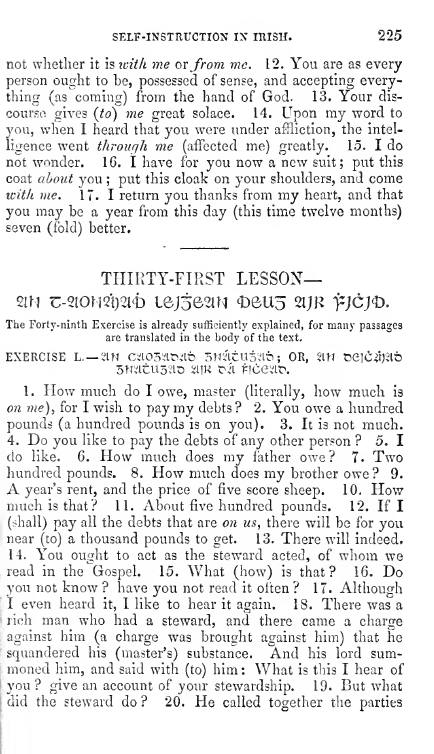
SELF-INSTRUCTION IN IRISH. 225
not whether it is xcitli me
ax
from
mc.
12. You are as every
person
ought to
be, possessed
of
sense,
and accepting
every-
thing (as coming)
from
the
hand of God.
13. Your dis-
course gives
{to) me great solace.
14.
Upon
my word to
you,
when
I heard that you
were under
affliction, the intel-
ligence went
through me
(affected me)
greatly. 15.
I
do
not
wonder. 16.
I
have for you now
a
new
suit;
put
this
coat
about you
;
put
this cloak on your
shoulders, and come
loith
me.
17.
I
return
you
thanks
from my heart,
and that
you may
be a year from
this
day (this
time twelve
months)
seven (fold)
better.
THIRTY-FIRST LESSON—
21H
T:-2iON2t)21t)
iej562íM
í)eU5
21
jR
}:jCjí).
The Forty-ninth
Exercise is already sufficiently explained,
for many
passages
are translated in the
body of the text.
EXERCISE L.
—
21W
CnOóil^ilb 5M^'ltU5.'lr>
;
OR,
21N t5eic4)2lb
5NiltU52lO 211K
tííl Piceilt>.
1.
How
much do
I
owe,
master (literally,
how much is
I
on
me),
for
I wish to
pay
my debts ? 2.
You
owe
a
hundred
pounds (a hundred pounds
is on you). 3.
It is not
much.
. 4. Do you
like
to pay the
debts
of
any other
person ? 5.
I
'do
like.
6.
How
much does my father
owe? 7. Two
'
hundred pounds.
8. How much does my
brother
owe ? 9.
A
year's rent, and the price
of five score
sheep. 10.
How
much is
that? 11. About five hundred
pounds. 12.
If
I
(shall)
pay all the debts that
are on
us,
there
will
be
for
you
near
(to)
a
thousand pounds
to get. 13. There
will indeed.
14.
You ought to
act as
the
steward acted,
of whom
we
read in the
Gospel. 15. What (how)
is
that?
16.
Do
you not know
? have
you
not read it
often ? 17.
Although
I
even heard
it,
I
like
to hear it again.
18.
There was
a
I
rich man who
had
a steward, and
there came
a
charge
Í
against
him
(a charge
was brought
against him) that he
I
squandered
his (master's)
substance.
And his
lord
sum-
moned
him,
and
said with
(to) him
: V/hat is this I
hear
of
you
?
give
an account
of your
stewardship. 19.
But
what
did the steward
do ? 20.
He
called
together the parties
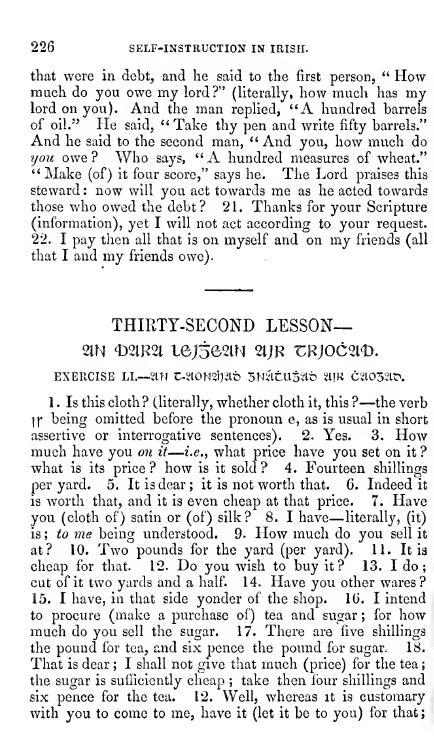
226 SELF-INSTRUCTION
IN
IRISH.
that
were
in debt,
and he said
to the first
person,
"
How
much do you owe my lord?"
(literally, how much has my
lord on you).
And the man
replied, "A
hundred
barrels
of oil."
He said,
"
Take thy
pen
and write fifty barrels."
And he said to
the second man,
"
And you, how much do
ijou
owe?
Who says, "A hundred measures of
wheat."
"
Make (of) it four
score," says he. The Lord praises this
steward
:
now will
you
act
towards me
as
he acted towards
those who
owed the debt? 21. Thanks for your Scripture
(information),
yet I will not
act
according
to
your request.
22.
I pay then all that
is on
myself and on
my friends (all
that I and
my friends
owe).
THIRTY-SECOND
LESSON—
21N
t)2lK2l l.ej5&2lM
2ljH
T:BJ0C2lt).
EXERCISE
LI.—
21N
C-^lOH3Í)Ílb
5NátU52lb 211«
C210521O.
1
. Is this
cloth? (literally,
whether cloth it, this
?
—
the
verb
\X
being
omitted before
the pronoun e,
as
is usual in
short
assertive or
interrogative sentences). 2.
Yes. 3.
How
much have you on it
—
i.e.,
what price have you set on
it ?
what
is its price
?
how is it sold ? 4.
Fourteen
shillings
per
yard.
5. It
is dear
;
it is not
worth that. 6. Indeed it
is worth that,
and it is even
cheap at
that
price. 7. Have
you
(cloth of) satin or (of) silk? 8. I have—literally, (it)
is ; to me being
understood.
9.
How
much do
you sell
it
at?
10.
Two
pounds for
the yard (per
yard), 11.
It
is
cheap for
that.
12. Do
you
wish to
buy
it? 13.
I do;
cut
of it two yards
and
a
half. 14.
Have you other wares?
15.
I
have,
in
that
side
yonder
of the shop.
16. I intend
to procure
(make
a
purchase of) tea and
sugar ;
for how
much do
you sell the sugar. 17. There are five shiUings
the
pound
for
tea, and
six
pence the pound for sugar.
18.
That is dear ; I
shall not give that much (price) for the tea
;
the
sugar
is
sufiiciently cheap
;
take then four
shillings and
six pence for the tea. 12.
Well,
whereas it
is
customary
with you to come to me,
have it (let it
be
to
you) for
that
;

SELF-INSTRUCTIOX
IN IRISH.
227
but,
upon
my
word to you,
it is cheap
;
and were it not that
it is
yourself
who aic
there, I
would
not give
it you at that
price.
20. I\Iay
good
be
(I am much
obliged)
to
you,
and I am
thankful to
you.
21.
What
is this
you
have (got)
in the
barrel
? 22.
Wine.
23.
What kind of
wine is it
—
Spanish wine
or
French
wine, white
wine
or red
wine.
Champagne or the
contrary ?
24.
It
is
only ordinary red
wine,
and it is three
shillings
a
bottle.
25.
I
shall
not
buy
it ;
wine is
dear
in
this country ;
I wish
I
were
in
France.
26.
Perhaps
it is
better
for
you to be
here
at
home.
27.
Have we a good
harvest
this year? 28.
We
have.
29.
Is
oats
dear, and is wheat?
30. They are.
31.
How much
is for
barley
;
(how
much) for rye
?
32. They are cheap.
33. Shall we have a
drink
since we are together?
34. We
will.
35. What do you
like
—a goblet of
wine
or a
bowl
of punch?
36.
I
shall have the goblet
of
wine. 37.
Is
not a
bowl
(glass or
tumbler) of
punch better, for I
like
to
"
send
round the bowl."
38. I prefer the
wine. 39.
Have
it so
; a
man's support
(is) his will.
EXERCISE LII.— ;IM oó^)^lt)
SMátuS^O
U)K C2l052lt>.
1
21 Sao]
At)
ói)ói|t
fíor)
ól l]on)
(the phrase
feéAr),
or
biiOT)
0|iTT7,
is understood).
2.
he
forjr), a Sao].
3.
Cia
ACA
]]•
^eA|i|i
leAC,
AT)
f]ox)
&eA]i5 t;o
AT)
\:]or)
^]Ovv?
4.
)Y
^eA|t|t
licit)
Ai)
f
]ot)
i:|Oi)T)
't)a
ai) ]:]or)
&eA|t5. 5.
<t)éAn
bATT)
ciueAlcAf
^íoi) ól \]on), A
beAt)
ua|*aiI: V]ov,
a
Saoi,
-pier)
50
'^)
TÍ)T)AO]
UAfA|l,
TDA
y
é bo
coil
&.
6.
oo
i:or)-
n)A]i,
A 6u]ve
có|]t.
7.
CjA
"
aca"
^eoil
if
-pei^ltTt
leAC
—
uAi)-f:eo]l,
eutjlAit,
t)0
CAOit-peoil?
8.
)f
peAitii
l]on) uAt)-
freoil.
9.
21
Saoi, cia
aca
}]'
n^iAi)
leAC-fA
?
10.
Bei6
CAOit-peoil
A5ATt),
n)A
'i*
i*e
bo
coil
é.
11.
"Cik,
50
n)Aic
;
beAitpAiO
t)0 CAjiAb
Ai)
BIacac AT)
TT)eAi*
bATT)
ii:]or)
ol liorr).
12.
3*^
i:oT)TT)Aix,
A
Saoi.
13.
Cia
"aca"
]y
-peAitji
Icac,
At)
'pÓflC
1)0
AT)
féAltltAlÓ?
14.
jf
l^eiVllll
llOTT)
AT)
'pÓftC.
15.
jf
biie;\5
AT)
fioT)
é
fo.
16. 'Cix
pAicciof
ti)5ii
a^t
SaC|\\1)1AC
At)0ir,
fAOl
'l)
b-'PllAlT)C,
fAOlllU).
17.
T/a
eA5L\
rpOjl
AlllCl.
18.
Cia
"aca"
If
fCAllll
leAC,
SACfAT)lAC
l)0
y^\x^]VC? 19.
]]' feivitji
le
-\xo]\)v
"
AXAp)!)"
SAcrAT)iAc;
li-
feAnil
le
n)5iiAt)
"
A5Aii)T),"
at)
pixAi^c
: bA
TT)-beiÓeA6
SACfAi)iAC T)'jof
ceAt)Ari)lA
\]VV7
AT;ur
5AT)
fcUbvAlÓ
A
6eA-
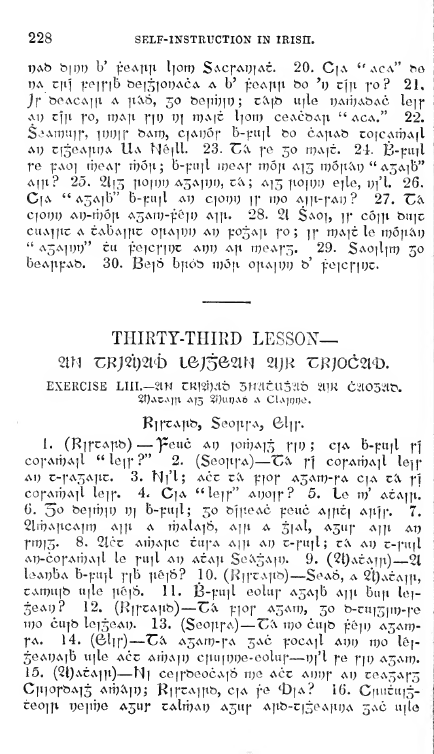
228
SELF-INSTRUCTION
IN IRISH.
T)<\b
bjor)
b' -peA]t|t
1]0tt)
SvAC|*At)TAC.
20.
Cja
"aca"
^o
r)<v
c]!]
^'ejfib
fc»e|5ior)ACA
a
b'
fei^^t^x
bo
'i;
ci|t
yo ?
21,
]]- &eACAi]i
A
]ia6,
30
bejii)]!);
c^iJo
Ujle
ijArbAb^c
le]]*
Ai) q]t
|-o, rr)A]i ]*]T)
t;]
n)A|C l]on)
ceAcbA|i
"
aca."
22.
SíAít^iqf,
TTjuii*
bATT>, c]Ai;ó|- b-]:u]l bo
CAjtAb
coicaitjajI
AT?
ci5eA|ti)A
Utv
t^éill.
23. "CCv
]'e
30
n^A^c. 24.
B-puil
re
fTAOT
rijeAT
Ti^óít;
b-puil
ii^eA^ n)ó]i
a]5
ir)óit<vi;
"
A5Aib"
Ai]i?
25.
2I13 jioiuu
ASAjt)!),
c^;
A13
|iO|i}i)
e]le,
i)]'l.
26.
CiA
"A3Aib"
b-fuil
Ai:)
cioi)u
ir
"^o
Ajii-fAi)?
27.
"Ca
cioot)
At)-ri)óti
A5An;-]:é]i)
a-||i. 28.
21
Sv^O|,
if
có]|i biqc
CllAl|lC A
CAb<V]|XC
0|tAli;i)
AT)
f03A1l
f
O
;
If
TT)<V]C
le
it)ó|iai)
"
A5AiT)iy'
til
feicntjc
aijt; a|i
TT)eAf5.
29.
SaoiIitt)
30
beAjtfAb. 30.
Be]6
bjiob
idóji
o]ia]i;i?
b'
-|:o]Cf|i)c.
THIRTY-THIRD
LESSON—
21M
T:R;2t)2l'b
Lej562lN
2ijK T:RjOC2l<t).
EXERCISE
LiiL—
?iN
rR]?f);aD
3w;'iru5'iib
2iir
c^os^itj.
HircA]tb,
SeojifA,
6lif.
I.
(HircA]tb)
—
peuc AT)
10TÍ)A13
f|i)
; cja
b-puil
x]
cofATt)A]l
"leif?"
2.
(SeojifA)
—
'Civ
f]
cofATÍ^Ail
le^f
Al)
C-fA3A|tC. 3.
Mj'l;
ACC
civ
-(i]Of
A5At1)-fA C|A CÍV
f]
cofATbAjl
le]f.
4<
CjA
"le]f"
Ar)0]f
? 5.
le
rv'
aca)|i!
0.
5^
be^TbiT)
T)|
b-fuil;
30
b]|teAC
yeuc
a||ic|
A|t]f.
7.
2ltr)v\jlCA]Tr>
A]|l
A
Tr)AlA]b,
AJJI
a
31
aI,
A3Uf
A1|1
AT)
frt)13.
8.
21CC AIT)A|tC
CUfA
Alll
AI)
c-fuil
; Ci\
Al)
c-fuil
AT)-C01*ATT)<\ll le
fllll
AT)
ACA|l
50^3^11).
9.
(2t)ACAllt)
21
leAr)bA
b-fiTil
fib
ji'e]6?
10.
(RifCA]ib)_SeAb, a
2{).\t^]^,
cATDuib
uile
it&i6.
11.
B-fuil
eoluf
A3Aib
Aijt
bufi
Ici-
3eAT)?
12.
(RifCAitb)—
"Civ
fiof
A3ATT),
30
b-cuisiii^-fe
TT)o
cuib
lei3eAi). 13.
(SeoiifA)
—
T/<x ttjo cii|b
féii)
A3An)-
fA.
14.
(6llf)
TiV
A3ATr)-fA
3AC
fOCAll
A1)t)
T1)0
léi-
3eAT)Aib
uile
acc
AtbAp)
ciiiiiT)i)e-eoluf
—
t)i'1
fe f|i)
A3ATT).
15.
(2t)ACAiit)
—
H] ceifbeocAiÓ
nje
acc
Ai)i)f ai)
ceA3Af3
C|ll0fbA]5
ATÍ)ÍV1T);
KlfCAlllb,
CjA
fe
«DfA?
16.
Cttitcui3-
ceoin
T)e]iT)e
A5ur caItt)at)
A3uf
A|ib-c|3eAiai)A
3v\c ujle
